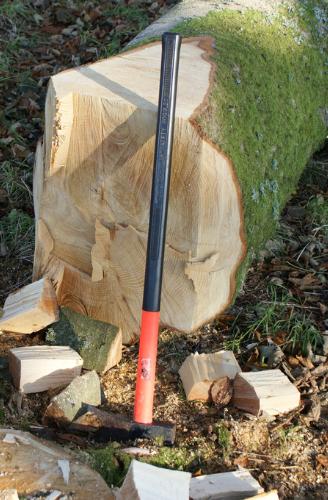Many strokes, though with a little axe, hew down and fell the hardest-timber’d oak. – William Shakespeare
 Quoting directly from The Third part of King Henry the Sixth, Act 2, Scene 1 (5th and 6th lines from the Messenger)
Quoting directly from The Third part of King Henry the Sixth, Act 2, Scene 1 (5th and 6th lines from the Messenger)
“And many strokes, though with a little axe / Hew down and fell the hardest-timber’d oak.”
What does that mean?
Specifically, the quote tells how a mighty warrior was killed when overwhelmed by sheer numbers. For us, it speaks to the virtue of perseverance. No matter how big the problem may seem, if we keep after it, we can succeed. It is similar to the concept of the wind and water wearing down mountain ranges, it just takes a little longer.
Why is perseverance important?
Perseverance is how anything gets done. Most people don’t learn to crawl on the first try. Some even go backwards for a while before they figure out the proper sequence of motions to move forward.
For walking, most kids start by trying to stand, then cruising (walking while holding on to the edge of a chair, couch, table, etc), before letting go and taking the first few steps. Even then, they end up on their butts after just a few steps. You probably couldn’t count the number of times a baby fails before they can walk all the way across the room.
That kind of perseverance is what got Edison the lightbulb, and babies all over the world show this kind of perseverance all the time. Perseverance is what you call it when something doesn’t work the first time, and you go back again (and again) with an updated plan or better skills.
Where can I apply this in my life?
In this quote, the Bard is talking about the toughness of a mighty oak tree, and how it can be felled (chopped down) by a small axe. He also mentions that it will take many strokes of the little axe to accomplish this task.
What is your mighty oak, the hardest timbered tree (implying toughest to chop down)? What is it that seems impossible, or at least impractical, to you? Would you get started on it if you knew you would win in the end?
For me, weight had not been a problem for most of my life. I had an abnormally high metabolic rate and simply didn’t gain weight. Then the inevitable happened. As I rolled on through middle age, the mighty metabolism slowed down. However my eating did not. Suddenly (not really, but it seemed that way), I was 25 pounds overweight.
My wife went through a similar process, but her metabolism slowed earlier than I did, and she needed to lose nearly double the weight I did. We lost weight the old fashioned way, one mouthful at a time. It took the better part of a year to do it (she was more disciplined than I), but the results were accomplished. And the pounds have stayed off for over a year now.
Write down a couple big projects you want to get done over the next couple of years. Write a book? Build something (or rebuild, repair, modify, etc)? Paint something? Learn a new skill?
I’ve been told that most people overestimate what they can do in a year and underestimate what they can do in a decade. What would you like to have accomplished 10 years from now?
If you broke the task into 10 big chunks, how big would each chunk be? Now take each of those chunks and break them into 10 smaller chunks. Now take each of the smaller chunks and break them into 5 little parts. You now have a decade long, week-by-week plan for your task.
Want to write a novel? Five hundred pages broken down into 10 years is 50 pages a year, or about a page a week. That sounds manageable. Even if you take a year to work out the outline, and another year to do all the research (if a character is a sailor, you should probably learn some appropriate terms, right?) , you are still can get away with just a sentence or two a day. Think you can find the time to do that?
Perseverance gets things done. A little each day, each week, can get an amazing amount of things accomplished. I have written a post a day (with one day off) for over 4 months now. That’s 133 posts!
I didn’t think I’d make it to 100, but that was over a month ago. I’m just going to keep at it. Who knows, I might eventually get good at it!
Set your sights on your target and do a little each day, each week, each month. Nothing is over until you either succeed or you quit. Are you a quitter?
From: Twitter, @quotesblog
confirmed at : http://shakespeare.mit.edu/3henryvi/3henryvi.2.1.html (5th and 6th lines from the Messenger)
Photo by Andrew Michaels







Pingback: What is harder than rock? What is softer than water? Yet hard rocks are hollowed out by soft water. | philosiblog